Main woh bala hoon jo sheeshe se pathar ko tod deta hoon.'
This menacing dialogue was the trademark of one of Bollywood's biggest baddies. Still confused? Here's another unforgettable dialogue from the same villain: 'Prem naam hai mera... Prem Chopra.'
Nothing was too bad for Prem Chopra's on-screen persona -- rape, murder, blackmail... In real life, however, the actor is calm and soft-spoken.
Chopra reminisces about his life and career in this walk down memory lane with Patcy N.
Early life
I fell in love with acting during my college days. There were lots of amateur theatre groups around and I acted with many of them. My work was appreciated and I won some prizes. I did plays in Hindi, English, Punjabi and Urdu. All of this encouraged me to become an actor.
After my BA, I told my father I want to act in films. He refused at first but, after seeing my dedication, he allowed me to go to Bombay. He had one condition though -- since I had graduated, I had to find myself a job first. I did exactly that.
I was lucky to land a job in the circulation department of The Times of India. I was their circulation inspector, handling Bengal, Orissa and Madhya Pradesh.
I would have to travel 20 days a month; in the remaining 10 days, I would struggle to become an actor. My salary at The Times was good, plus I would get first class fare to travel and a daily allowance too.
In those days, all the producers sat at Naaz cinema and Famous Studios because all of them had their offices there. I tried, but realised that it is not easy to get into films. All the producers would say leave your address, but nobody ever called.
'I was depressed after meeting producers'
Image: Prem ChopraHis first Punjabi film
One day I was travelling by train -- in fact I was returning after meeting producers and listening to their no's and I was depressed -- when this man comes up to me and says, 'You have come to Bombay to become an actor.' I said 'Yes'. He said 'Can you come with me now and we will go to Ranjit Studios.' I said 'Yes'.
On the way he told me there is a hero's role in a Punjabi film. I was reluctant, but I thought a break in a Punjabi film would at least get me noticed.
The film was Chaudhary Karnail Singh. Jagit Shethi did the title role but they wanted someone to play the second lead of a Muslim boy. Lots of boys had auditioned for the role but I got it. Shooting was to start immediately so I had to take leave from my job.
Chaudhary Karnail Singh became the biggest hit in Punjab. I started getting more offers to work in Punjabi films and I did a couple of more films, but I realised that by doing Punjabi films I am not getting any benefit.
'You have to work well to get noticed'
Image: Prem ChopraFirst break in Hindi films:
My first Hindi film was Dr Vidya, then Shaheed and then Woh Kaun Thi?. Though there have been some 25 films on Bhagat Singh since then, people still cry when they see our Shaheed.
We were passionate about our work; we had enthusiasm. People like me thought that if we have to work, we will put our heart and soul into it.
I noticed one thing early on in my career: only your work will bring you more work. No contacts, no bootlicking was useful, you have to work well to get noticed.
'Woh Kaun Thi became a huge hit and I became a villain'
Image: Prem Chopra in UpkarHow Mehboob Khan predicted his future
I remember one nice incident. I would go to Mehboob Studio during my struggling days, and I met Mehboob saab after Son Of India. He saw me and said, 'Tum main dum hain, tum roz yahan aakar mujhe milo, main tumhe acha break doonga, kuch galat kaam nahi karna (You have talent, you come and meet me every day and I will give you a break. Don't do anything wrong before that).
I would go to Mehboob Studio every day and sit in one corner, but I realised that Mehboob saab was very sick and wouldn't be starting work any time soon. So I took Raj Khosla's Woh Kaun Thi?. They wanted an unknown face.
I was paid very little but I needed the work. And then, the movie had such a big director and actors like Manoj Kumar and Sadhana. I had a total of three appearances in the film. It was a suspense film and my character added to the suspense in the film.
Mehboob Khan was the chief guest at the premiere of the film. The next day, coincidentally, I was shooting at Mehboob Studio, and Mehboob saab came especially to meet me. He was very upset. He said, 'I told you not to take the wrong role and you did that; you took a negative role in the film and this film is going to be a huge hit and you will be typecast as a villain from now on.'
Woh Kaun Thi? did become a huge hit and I became a villain. I got more films in the role of villain -- Teesri Manzil, Upkar... My character had negative shades in these films that were huge hits and I got the status of a villain.
'I was getting famous and I was getting typecast'
Image: Prem Chopra in KrantiGetting famous and typecast
I left my job with The Times Of India when we were filming for Upkar. I was not supposed to work anywhere else when I was working for The Times, so I was scared somebody would print my picture. In fact my picture did appear a few times but nothing happened.
Pran saab had grown old and had shifted to character roles. In some films we played father and son, like in Purab Aur Paschim and Anjaana.
I started getting lots of roles, but I had decided that I would never overwork. Many actors did five shifts, but that was not my cup of tea. I was a very honest and hardworking actor.
My dialogues also started getting popular, like Main woh bala hoon...(Saboot), Shamboo ka dimaag do dhaari talwaar (Kranti), Prem naam hai mera... Prem Chopra (Bobby).
I was getting famous and I was getting typecast. There was no other source of entertainment those days except cinema, so people knew you as a hero, heroine or villain even when you were off the screen.
Villains did bad stuff like murder and rape so people were scared of them. When people looked at me on the streets, they would think I must have done such things in real life too.
'What sort of reputation do you have?'
Image: Prem ChopraReel life and real life:
One such funny incident occurred when my father and I were strolling in Chandigarh one day and four couples were coming from the opposite direction. Suddenly, one man among them said, 'Arey bhai, apne biwiyon ko bacha lo. Prem Chopra aaya hua hai (Beware, take care of your wives Prem Chopra has arrived).'
My father got upset and said, 'What sort of reputation do you have?'
Later, the boys met me and said they were surprised to find me so simple and normal in real life.
Today, things have changed and an actor is accepted even if he is playing a negative role because it is the performance that they appreciate.
There was competition those days too. It is a natural process. I never felt bad about the competition or anyone getting more work then me. People have been kind to me and have appreciated my work. I am still getting work at this age.
'Even the best director won't get work if his film flops'
Image: Prem ChopraOn his favourite roles and his expectations from his films
It's difficult to say which of my characters is my favourite; it is difficult to judge myself. There were some characters that I played that I loved, but the films didn't work, like Aap Aayi Bhara Aayi or Aas Paas, where the film revolved around my character.
I thought after these films I will be in a different and bigger league altogether, like Raaj Kumar. The producer and director also told me I had done a brilliant job and must stop accepting smaller roles and the usual villainish roles. 'Ask for your price and ask for better roles,' they encouraged me.
But this is a commercial business. If the picture succeeds, the actor succeeds. Even the best director won't get work if his film flops.
I was banking on these two films and so refused work that came my way until the films released. But both films flopped. The lesson I learnt was that you can't judge your work, you are here because of the public.
'Amrish Puri played my henchman in a couple of films'
Image: Prem Chopra Cyrus Sahukar in Delhi 6Shift to character roles
All the heroes were my friends; we are still friends. We had great rapport. We had superstars like Dilip Kumar and Rajesh Khanna. They were superstars and never able to adjust.
You have to change according to the times. I have adjusted. I know I won't get bigger roles so I have started doing character roles and some of the character roles are so good.
There were big villains like Pran saab, Yakub and Jeevan. Amrish Puri played my henchman in a couple of films but he zoomed in a big way after Mogambo (the character he played in Mr India).
I did positive roles in Prem Tapasya and Jadu Tona but, again, those films were not big hits. Jadu Tona was based on The Exorcist and I had a great role in it as the father of the girl who was possessed.
Pran saab did character roles and those films were super hits, like Upkar. His whole persona changed after this role.
I am also doing positive and comic roles now. In order to sustain myself in the industry, I had to do it because I have the desire to be here in this profession.
The people have accepted me in some of the positive characters that I have done recently and the films have been successful.
'Then and now, a film with a good storyline always works'
Image: Prem Chopra in Agent VinodOn the difference in the industry now and then
Everything changes with time, so has the industry. Many films used to be made when there was no other medium of entertainment; today, there are so many shows and television channels.
Before, an average film was good enough, but today you have to only make successful films or else you are nowhere.
Earlier, it took a longer time to make a film and there was a lot of hard work involved; now, whatever hard work is required is done in pre-production.
They have bound scripts with dialogues that are distributed among the actors and technicians. We would get scenes when we came on the sets. This is much easier. I like this system of working better.
The intensity and the quality of work are mostly missing now. People have become very materialistic and commercial. They want to make fast pictures.
All the big films are on for not more than one week because of piracy and other reasons. Therefore, more prints of a film are made as they have to recover the money in one week. In one week, they decide whether the film is a hit or flop. The films I have worked in have seen golden jubilees.
Heroes today have started playing negative roles. There are no real heroes because heroes find the role of the villain very fascinating. Whenever the hero plays the role of a villain, there's always a justification for it at the end.
Today's villains have also changed. He is a real life character -- terrorist, politician, policeman...
One thing remains constant: then and now, a film with a good storyline always works.
'I Love New Year is a very emotional role'
Image: A scene from Rocket Singh Saleman Of theYearForthcoming films
Recently I played a don once again in Agent Vinod. It had different shades but you must have seen a reflection of the old Prem Chopra in it. It was an interesting film.
I am doing Sunny Deol's father's role in my forthcoming film I Love New Year. It is a very emotional role.
Then there is Chalo Driver, a light film.

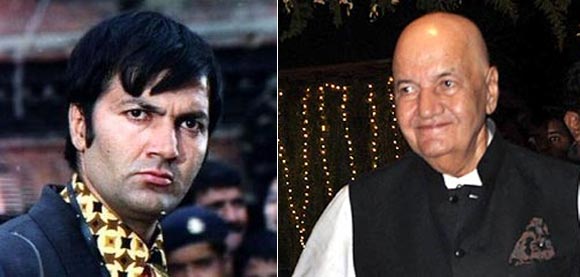
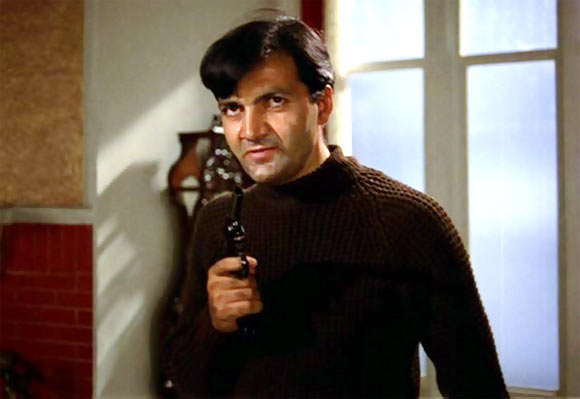
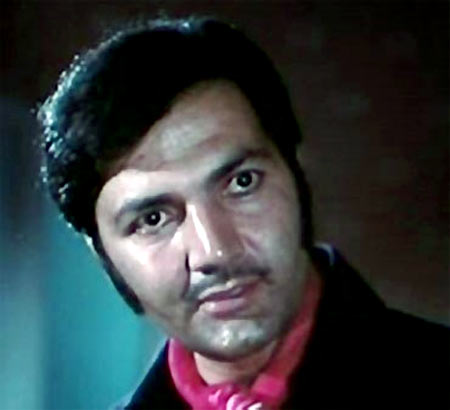
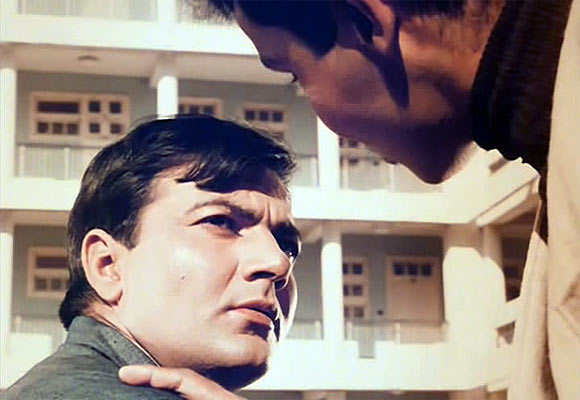
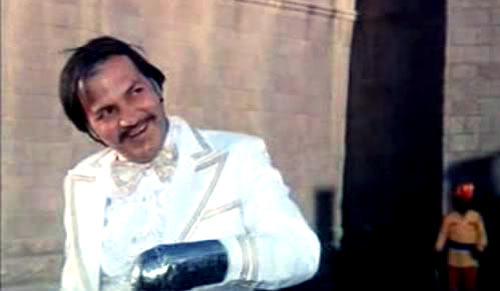
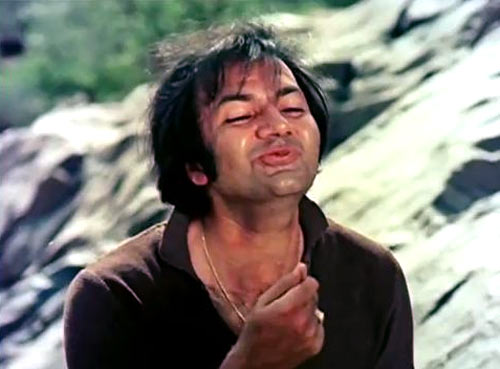
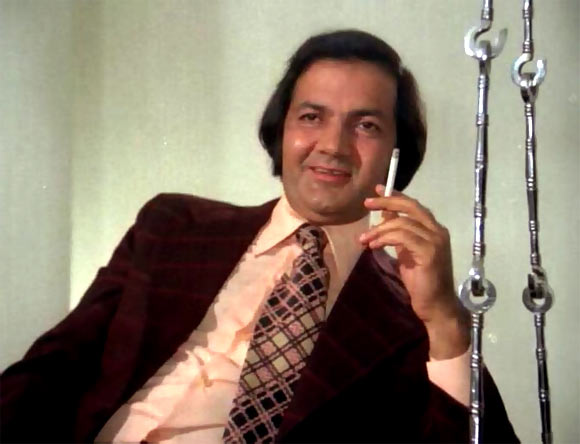
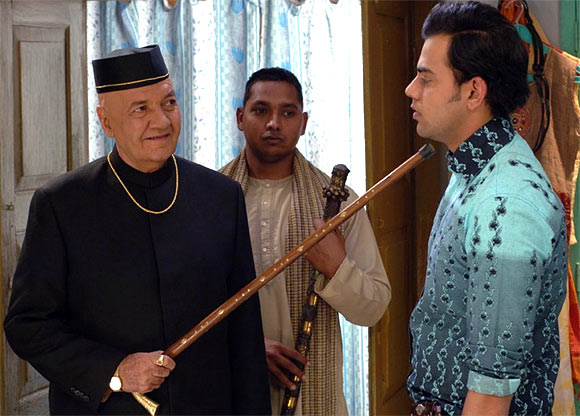

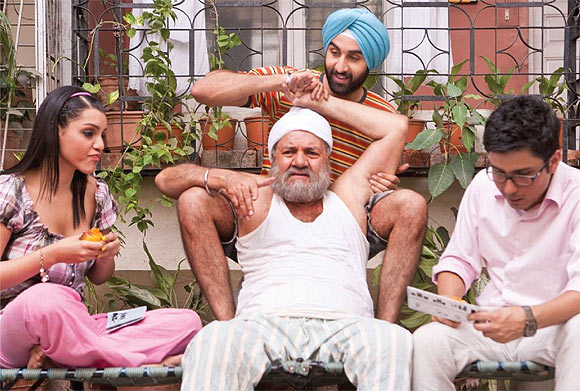
Comment
article